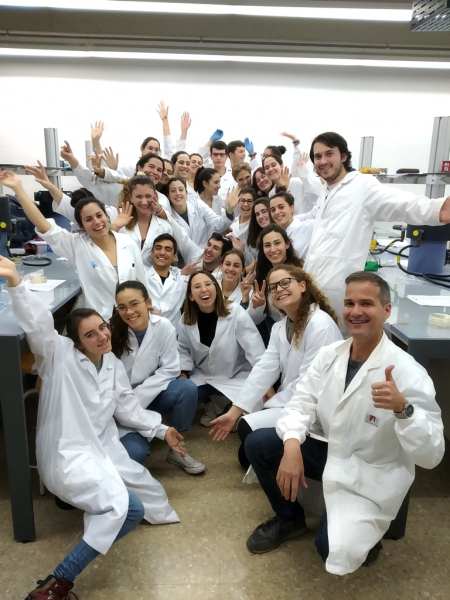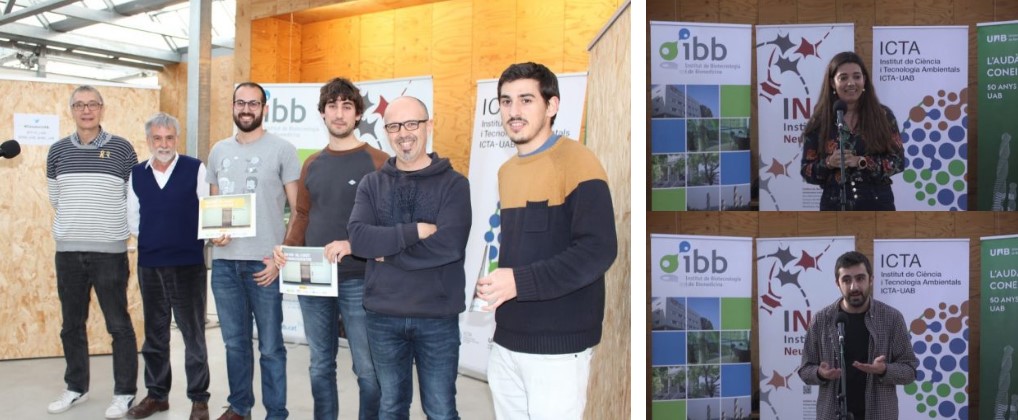Featured activities
OUTREACH MATERIALS
- Get to know the IBB through this video!
- This video (only in Spanish) explains the problem of Parkinson's and the SynuClean-D strategy as a possible effective therapy to attack the disease. This project is being carried out from the laboratory of Salvador Ventura from the IBB.
- Speech on nanoscience and nanotechnology (only in Catalan) on Catalunya Radio (the Night of the Ignorants) by Júlia Lorenzo, expert in nanotechnology: “We will be faster, more precise and more efficient”
CITIZEN SCIENCE
MicroMón
The MicroMón project is an international project of the Autonomous University of Barcelona (UAB), coordinated by Dr. Montserrat Llagostera of the Campus Microbiology Unit of the Department of Genetics and Microbiology. The project is integrated into the MicroMundo network of the Spanish Society of Microbiology (partner of Tinny Earth®).

This citizen science project aims to encourage high school students (aged 15 to 17) to carry out scientific tasks in order to contribute to finding solutions to one of the most important challenges for human health in this century: the increase in microbial antibiotic resistance.
UAB undergraduate students work as technical assistants to lead scientific activities with high school students. These technical assistants are instructed and supervised by UAB Microbiology professors who act as associate instructors for the project.
The MicroMón project allows high school students to face a real research project in their schools, to apply the scientific method, to validate the results, to analyze the data obtained and to reach conclusions. Thanks to their participation, the scientific community benefits from access to a larger collection of bacteria to identify those potential producers of antibiotics of interest to society.
In addition, the project allows citizens to become more aware of this global health problem.

The first edition of the project at the UAB was developed during the 2017-2018 academic year and researchers Isidre Gibert, Daniel Yero and Oscar Conchillo from the Molecular Genetics and Bacterial Pathogenesis group at the IBB have been participating since then as associate instructors to train the undergraduate students who will lead the program with high school students.
The UAB has opened a crowdfunding page where you can make the financial contribution you want to help towards the project execution.
- Web: MicroMón
- Twitter: https://twitter.com/MicroMonUAB
- Facebook: https://www.facebook.com/MicroMonUAB/
- Instagram: https://www.instagram.com/micromonuab/
COMPETITIONS
The institutes of the Autonomous University of Barcelona, IBB, INc and ICTA, organized the Elevator Pitch competition on March 14, 2019 in the ICTA-UAB building, an initiative aimed at doctoral students and postdoctoral researchers from their centers and subsidized by FECyT.
The registrants enjoyed a free course taught by the Big Van Ciència group that gave them tools and techniques for scenic oral storytelling to be able to explain their research projects in just two minutes in an interesting, enjoyable and fun way and arouse the interest of the audience.
5 doctoral students from IBB participated and you can find their Elevator Pitches below (in Spanish):
- “Esfuerzo en equipo” Covadonga Vara
- “El twitter de las bacterias” Xavier Coves
- “Las inversiones están de moda” Ruth Gómez
- “Hay un neandertal en mí” Marta Coronado
- “El futuro es de las inversiones” Jon Lerga (2nd prize)

EDUCATIONAL PROGRAMES
NanoEduca is a program designed to introduce nanoscience and nanotechnology to secondary and high school students and teachers. The entities promoting this initiative are the University of Barcelona (UB), the Catalan Institute of Nanoscience and Nanotechnology (ICN2), the Autonomous University of Barcelona (UAB) and the CESIRE of the Department of Education of the Generalitat of Catalonia.
This program received the 2018 National Science Communication Award awarded by the Government of the Generalitat and the Catalan Foundation for Research and Innovation (FCRi).
Júlia Lorenzo from the IBB actively participates in this outreach program that is divided into three complementary lines of action: teacher training; Nanokit (pedagogical kits available for free loan at the Pedagogical Resource Centers of the Department of Education); and an annual poster and video competition on nanotechnology.
Since 2015, NanoEduca's content has reached more than 6,000 students from more than 300 educational centers, mainly in Catalonia but also in the Basque Country, the Community of Madrid and the Austrian city of Salzburg.
TRAININGS
Summer Course “What can we do to reduce antibiotic resistance?”
This course was taught by Xavier Coves, Isidre Gibert González, Pol Huedo and Daniel Yero, members of the Molecular Genetics and Bacterial Pathogenesis group, to students in 3rd and 4th years of ESO, Baccalaureate and Training Cycles.
The classes took place from July 1 to 5 in 2019 at the IBB and the following contents were covered:
- Learn what an antibiotic is and how it works.
- Common bacterial pathogens and how antibiotics can be used to treat bacterial infections.
- Introduction to the problem of antibiotic resistance. Mechanisms of resistance. Concepts of resistance: intrinsic, acquired and phenotypic.
- The global emergence of antibiotic resistance and its impact on the clinic and society.
- Genetic determinants of antibiotic resistance in bacterial genomes.Methodologies for assessing bacterial sensitivity to antibiotics and detecting resistance mechanisms.
- The role of society in the problem of antibiotic resistance. Campaigns on the correct use of antibiotics.
- The search for new antibiotics. Current status of the search for new antibiotics.
- New antibacterial therapies and alternatives to antibiotics.
The program consisted of an introductory theoretical session (2 hours), three laboratory sessions (2 hours each), 6 hours of workshops to promote the correct use of antibiotics and three additional sessions (2 hours each) for students, organized in teams, to discuss the results and the strategies to follow. At the end of the course, a final event was held where students presented posters and murals with the aim of disseminating to society the correct use of antibiotics and thus avoiding resistance.
